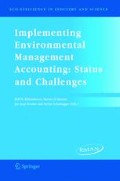Abstract
As a result of increased corporate environmental costs since the 1970s and steadily rising costs and innovation pressure in globalised competition, corporate environ-mental cost accounting (ECA) is continuously under attention. Cost management decisions — and ensuing entrepreneurial decisions — will increasingly depend on successful acquisition and transfer of information and data that consider ecological as well as economic effects. Sustainable future-oriented corporate governance will not function without an ECA to support the planning, management and control of the company.
Within the framework of the project Integration of ECA into environmental management systems in SME’s sponsored by the German Federal Foundation for the Environment (Deutsche Bundesstiftung Umwelt — DBU), Osnabrück, ECA was successfully implemented in more than ten companies. The project was carried out in co-operation between the Institut für Ökologische Betriebwirtschaft (IöB), Siegen, and the Internationales Hochschulinstitut (IHI), Zittau, both Germany. The objective of this project was to show economic and ecological advantages of, but also barriers to, ECA implementation by examples of German companies on the one hand and Czech and Polish ones on the other. The selection criteria as regards the companies were on one hand the size of the enterprise and on the other the willingness of management to implement an ECA. The project was especially focused on the operational use in SMEs and represents a further development of existing flow cost accounting systems (see e.g. Burritt and The following describes the implementation methodology developed in the project and illustrates how this Schaltegger, 2000).
The following describes the implementation methodology developed in the project and illustrates how this method was applied in one of the companies which participated in the study.
Access this chapter
Tax calculation will be finalised at checkout
Purchases are for personal use only
Preview
Unable to display preview. Download preview PDF.
References
Burritt, R.L., Hahn, T. and Schaltegger, S. (2002), An Integrative Framework of Environmental Management Accounting — Consolidating the Different Approaches of EMA into a Common Framework and Terminology. In: Bennett, M., Bouma, J.J., and Wolters T. (eds.), Environmental Management Accounting: Informational and Institutional Developments. Dordrecht: Kluwer Academic Publishers, pp. 21–35.
Burritt, R.L. and Schaltegger, S. (2000), Contemporary Environmental Accounting. Sheffield: Greenleaf Publishing.
Burritt, R.L., Petersen, H. and Schaltegger, S. (2003), An Introduction to Corporate Environmental Management: Striving for Sustainability. Sheffield: Greenleaf Publishing.
European Union (EU) (2001), Verordnung (EG) Nr. 761/2001 über die freiwillige Beteiligung von Organisationen an einem Gemeinschaftssystem für das Umweltmanagement und die Umweltbetriebsprüfung (EMAS), Amtsblatt L 114/1, 24th April 2001.
Fichter, K., Loew, T. and Seidel, E. (1997), Betriebliche Umweltkostenrechnung. Berlin: Springer (Available only in German).
Fischer, H. and Blasius, R. (1995), Umweltkostenrechnung. In: German Federal Environmental Agency (Umweltbundesamt — UBA) (ed.): Handbuch Umweltcontrolling, 1st ed. Munich: Vahlen (Available only in German).
Foster, G. and Gupta, M. (1990), Manufacturing Overhead Cost Driver Analysis. Journal of Accounting and Economics 12: 309–337.
German Federal Environmental Agency (Umweltbundesamt — UBA) (1996), Handbuch Umweltkostenrechnung. Munich: Vahlen. (Available only in German).
Hallay, H. and Pfriem, R. (1992), Öko-Controlling — Umweltschutz in mittelständischen Unternehmen. Frankfurt: Campus (Available only in German).
Heller, M., Shields, D. and Beloff, B. (1995), Environmental Case Study: Amoco Yorktown Refinery, in: Ditz, D., Ranganathan, R. and Darryl, R. (eds.) Green Ledgers. Baltimore: WRI, pp. 47–81.
Heupel, T. and Wendisch, N. (2003), Green Success: Process based Environmental Cost Accounting — Implementation in SME’s in Germany. In: Bennett, M., Rikhardsson P.M. and Schaltegger, S. (eds.), Environmental Management Accounting — Purpose and Progress. Dordrecht: Kluwer Academic Publishers, pp. 333–363.
IMU (2003), Eco-Efficiency through Flow Management, [online] [cited 04 Nov. 2003] Available from Internet URL <:http://www.eco-effizienz.de/eco/>
International Standards Organization (ISO) (1996), ISO 14001:1996, Environmental management systems, Specification with guidance for use. Brussels.
Kosmider, A. (1993), Controlling im Mittelstand, 2. ed. Stuttgart: Schaeffer (Available only in German).
Letmathe, P. (1998), Umweltbezogene Kostenrechnung. Munich: Vahlen (Available only in German).
Letmathe, P. and Wagner, G.R. (2002), Umweltkostenrechnung. In: Küpper, H.-U. and Wagenhofer, A. (eds.) Handwörterbuch Unternehmensrechnung und Controlling, 4th ed, 1988–1997. Stuttgart: Schaeffer-Poeschel (Available only in German).
Reinemann (1999), Was ist Mittelstand? In: Wirtschaftwissenschaftliches Studium, 1999, 12 661 et sqq. (Available only in German).
Spengler T. and S. Hähre (1998), Stoffflussbasierte Umweltkostenrechnung zur Bewertung industrieller Kreislaufwirtschaftskonzepte. Zeitschrift für Betriebswirtschaft 2: 147–174 (Available only in German).
Umberto (2003), umberto — the software tool for the environmental management [online] [cited 04 Nov. 2003] Available from Internet URL <:http://www.umberto.de/english/>.
Author information
Authors and Affiliations
Editor information
Editors and Affiliations
Rights and permissions
Copyright information
© 2005 Springer
About this chapter
Cite this chapter
Wendisch, N., Heupel, T. (2005). Implementing Environmental Cost Accounting in Small and Medium-Sized Companies. In: Rikhardsson, P.M., Bennett, M., Bouma, J.J., Schaltegger, S. (eds) Implementing Environmental Management Accounting: Status and Challenges. Eco-Efficiency in Industry and Science, vol 18. Springer, Dordrecht. https://doi.org/10.1007/1-4020-3373-7_10
Download citation
DOI: https://doi.org/10.1007/1-4020-3373-7_10
Publisher Name: Springer, Dordrecht
Print ISBN: 978-1-4020-3371-1
Online ISBN: 978-1-4020-3373-5
eBook Packages: Earth and Environmental ScienceEarth and Environmental Science (R0)

